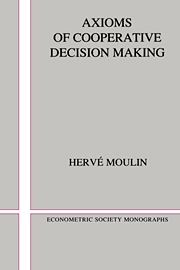10 - Strategyproofness and core stability
Published online by Cambridge University Press: 05 January 2013
Summary
Overview
In plurality voting it is sometimes rational to cast one's vote for another candidate than one's first-best choice: If I know that my most preferred candidate a will not pass because b and c are both going to get more votes, then I had better help whomever of b, c I like more. In any voting method when a voter realizes that his own vote may influence the final outcome, he thinks twice before casting it. Maybe the naive ballot suggested by his true preferences does not serve his interest best. Rather than passively reporting his opinion about candidates, he acts as a player in the game of election, trying to maximize the returns from his vote.
In real-world elections it is impossible to distinguish a strategically biased report of a voters' preferences from a truthful one. One's opinion is private information de jure, and hence an openly untruthful report is a perfectly legal move.
Several early analysts of voting methods were aware of their strategic aspects, thought of as the nuisance of a dishonest vote; see the quotation by Borda in Straffin [1980] or by Dodgson in Farquharson [1969]. A mathematically rigorous attack of the problem has come only in the last 15 years. The seminal question is this: Can we design a strategyproof voting rule, namely, such that each individual voter would always want to report his opinion truthfully while isolated in the voting booth?
- Type
- Chapter
- Information
- Axioms of Cooperative Decision Making , pp. 256 - 282Publisher: Cambridge University PressPrint publication year: 1988



